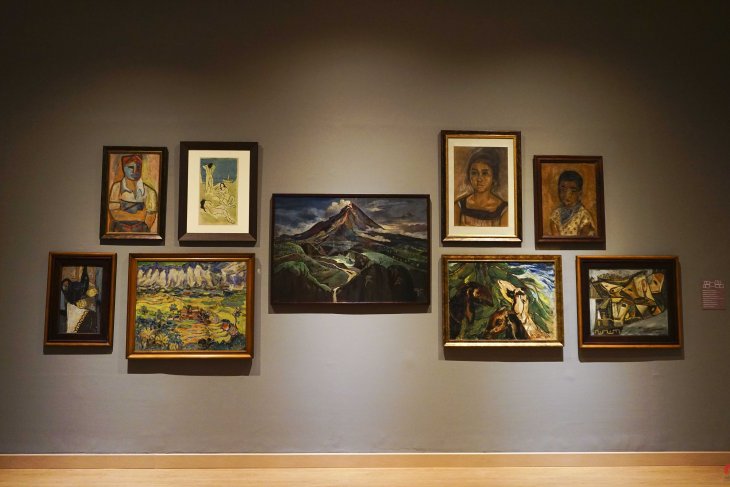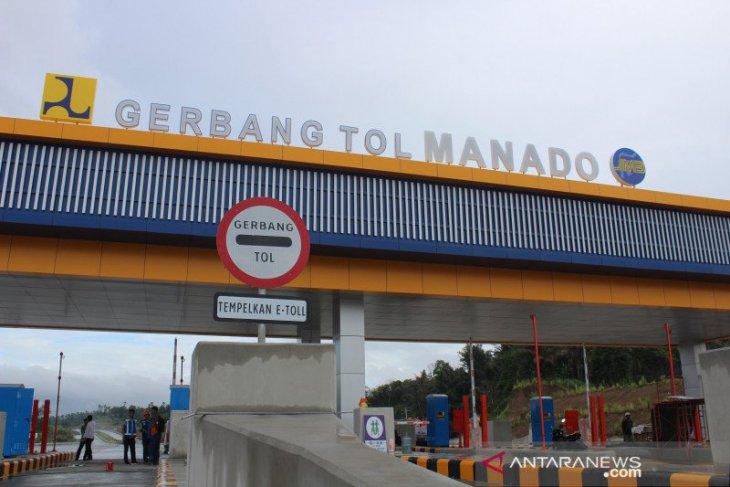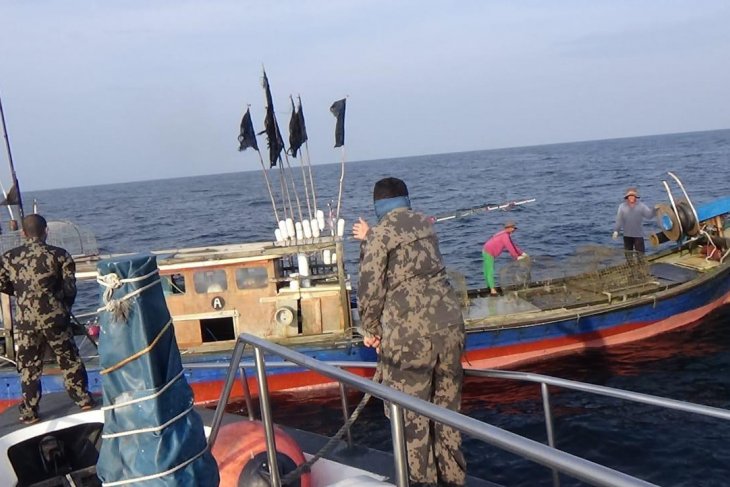Live Streaming
Program Highlight
Company Profile
June
The National Gallery of Indonesia in Jakarta Reopened to Public
Written by Ani Hasanah
A permanent exhibit displayed on the second floor of Building B at the National Gallery of Indonesia in Jakarta.
The National Gallery of Indonesia in Jakarta has been reopened to public from Tuesday, June 16, 2020, with several health protocols in place in view of the COVID-19 pandemic.
With the Indonesian capital transitioning from Large-Scale Social Distancing (PSBB) measures to the new normal, it is one of the art galleries that citizens can now visit after being stuck at home for almost three months.
Visitors will only be allowed to view a permanent exhibit of the National Gallery's collection, displayed on the second floor of Building B, while complying with new health protocols.
"Our new (visitor entry) procedure aims to ensure the safety and comfort of anyone coming here," head of the National Gallery, Puspanto, said in a statement received on Wednesday.
The staff at the gallery have been provided personal protective equipment and thermometers. Public areas within the complex building are being cleaned more often, while sinks and hand sanitizer dispensers have been installed at several spots, he explained.
Those planning to visit the gallery will now have to register themselves beforehand. Visitors making online registrations (at least 24 hours prior to the visiting time) will have to furnish the confirmation email at the entrance. On-site registrations are also being taken to allot visiting times.
Registered visitors will be required to reach the gallery at least 30 minutes before their session begins to allow time for the verification process. Besides this, visitors would need to be in good health, wash hands and don masks, and bring few belongings as the deposit counter has been closed, said Puspanto.
The National Gallery will be open from Tuesday to Friday, 9 a.m to 3 p.m. It will offer about five sessions of 60 minutes duration each, with a 30-minute break. (ANTARA)
June
Ministry of Public Works and Housing: 15 Toll Road Sections to be Inaugurated in 2020
Written by Ani Hasanah
The Manado-Bitung toll road exit. ANTARA/Karel A Polakitan/am.
The Public Works and Housing Ministry, Wednesday, highlighted that the work to construct 15 toll road sections in several Indonesian provinces would be completed this year, with five of them inaugurated in June and July.
"Toll road sections, spanning 297 kilometers, are ready to be inaugurated this year," Director General of Highways at the Public Works and Housing Ministry Trisasongko Widianto noted in Jakarta on Wednesday.
The road sections ready for inauguration in June and July are Section 4 of Banda Aceh-Indrapuri-Blang Bintang, spanning 14 kilometers; Section 1-6 of Pekanbaru-Kandis-Dumai, reaching 131 km; Section 2 of Depok-Antasari, totaling six km; Section 1A of Cimanggis-Cibitung, spanning three km; and Section 1 and Section 2A of Manado-Bitung, reaching 21 km.
During a videoconference organized by the Indonesian Chamber of Commerce and Industry (KADIN), Widianto also drew attention to 12 toll road sections also ready to be auctioned this year.
The total length of those toll road sections reaches 669 kilometers, while their investment expenses were estimated to reach Rp242 trillion. The toll road sections ready to be auctioned include the Gedebage-Tasikmalaya-Cilacap, Access Road of Patimban, Jogja-Bawen, Solo-Yogyakarta-NYIA, and Semarang's Harbour Toll Road.
Public Works and Housing Minister Basuki Hadimuljono has earlier stated that nine other toll road projects were ready for the pre-qualification stage of auction in June and July 2020.
Furthermore, the ministry had chalked out a plan to auction a multi-lane free flow (MLEF)-based cashless transaction of the toll road system project for the toll road sector, he stated, adding that four toll road sections were ready to be operated by the end of June to support Indonesia's economic recovery efforts.
Since the first and second leadership terms of President Joko Widodo (Jokowi), infrastructure has held special significance, with the remarkable extension of toll roads being testament to it.
According to the Public Works and Housing Ministry, during the first leadership term of President Jokowi, at least 941 kilometers of toll roads and 3,423 kilometers of national roads were constructed.
Work on the Trans-Java Highway that connects the ferry port in Merak, Banten Province, to Surabaya, the capital city of East Java Province, is complete, thereby reducing the travel time and current logistics costs.
As part of the central government's prioritized development projects, the toll roads are not merely constructed in Java, but they are also built outside the island, such as Sumatra, Kalimantan, and Sulawesi.
In Sumatra Island, several sections of the Trans-Sumatra Toll Road have been completed, while the government is eyeing to complete entire sections in 2024.
The work on the Trans-Sumatra Toll Road Construction project is still underway. State-owned construction companies involved in the project have striven ceaselessly to ensure it is completed in line with the set target. (ANTARA)
June
Filipino and Malaysian Fishing Boats Detained by Indonesia over Poaching
Written by Ani Hasanah
Indonesia's patrol boat detains a foreign fishing boat for illegal fishing activities . ANTARA/HO-KKP
Patrol ships of the Ministry of Maritime Affairs and Fisheries’ (KKP's) Directorate General for Supervision of Maritime Resources and Fisheries (PSDKP) detained a Filipino fishing boat and Malaysian fishing vessel for poaching in Indonesian waters.
"The KKP's patrol boats have succeeded in detaining two vessels found poaching in the Fisheries Management Area (WPP) 571 in the waters of Malacca Strait and WPP 716 in Sulawesi Sea. The two vessels were seized on Tuesday (June 16)," Director General of Maritime Resources and Fisheries Supervision Tb Haeru Rahayu stated here on Wednesday.
The first arrest was made by the ministry's patrol boat, Hiu 15, led by Capt. Hendro Andaria of a Philippine-flagged fishing vessel in the Sangihe waters near Marore Island for conducting illegal fishing activities.
M/Bca SOFIA of the Philippines had on board five Filipino crew members.
The ship, using tuna hand line fishing gear, was detained at the coordinates of 04 ° 47.265 ' northern latitude and - 124 ° 41.095' eastern longitude.
"The Philippine-flagged ship was taken to the PSDKP Tahuna Station for legal proceedings," he stated.
At another location, patrol boat Hiu 01, led by Albert Essing, detained a Malaysian-flagged fishing vessel SLFA 5070, with four Malaysian crew members onboard.
The ship using bamboo fishing gear was detained at the coordinates of 02 ° 44.918 " northern latitude and 101 ° 100.788" eastern longitude.
Since October 2019, Indonesia had detained 47 foreign fishing vessels for poaching in Indonesian waters.
The 47 vessels comprised 20 Vietnam-flagged vessels, 14 Philippine-flagged boats, 12 Malaysian-flagged vessels, and one Taiwanese-flagged boat. (ANTARA)
June
The Ministry of Public Works and Public Housing to Build 1.5 million Self-Support Houses in 2020-2024
Written by Ani Hasanah
The Ministry of Public Works and Public Housing (PUPR) will build 1.5 million self-support houses as part of the priority program plan for the 2020-2024 period.
"For the housing sector, we will build 50 thousand apartment units, 25 thousand special housing units, and 1.5 million self-support houses," Director General of Construction of the Ministry of PUPR Trisasongko Widianto stated during an online seminar here on Wednesday.
The ministry will also construct 2,500-kilometer (km)-long toll roads, three thousand-km-long new roads, and 60-km-long bridges to boost the nation's connectivity.
The other priority programs of the PUPR ministry encompass endeavors to increase per capita annual water availability to 60 cubic meters, construct 60 dams and one thousand reservoirs, as well as focus on 500 thousand hectares of irrigation areas.
Furthermore, the ministry will streamline services to increase access to drinking water to up to 80 percent and access to sanitation and solid waste treatment services in up to 10 thousand hectares of slums.
"The Ministry of PUPR has a major task for the 2020-2024 period," Widianto remarked during an online seminar held by the Indonesian Chamber of Commerce and Industry (Kadin).
In the previous programs, the ministry, through the Housing Fund Management Center (PPDPP), prioritized improving the quality of housing for people from the low-income bracket (MBR).
PPDPP President Director Arief Sabaruddin stated that the government can increase the quota in the wake of numerous breakthroughs in future.
PPDPP is also upbeat about having in place a Housing Data Center and finding other sources of funding outside the APBN. (ANTARA)


